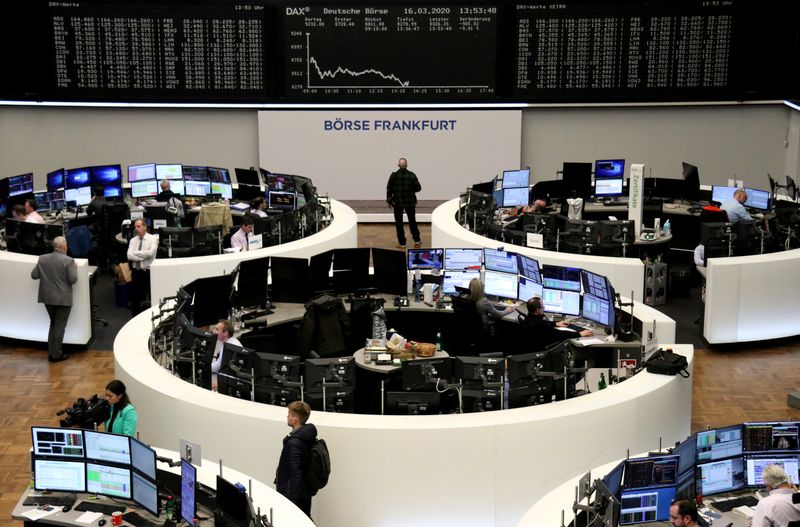BRUSSELS (Reuters) - The coronavirus pandemic has revived the acrimonious debate between euro zone countries about jointly issuing debt to meet healthcare needs and address the deep economic downturn that is set to follow.
Nine of the 19 countries that use the single currency called on March 25 for a common debt instrument issued by a European institution to fight the outbreak and its effects.
The idea of such debt, called "coronabonds", was rejected by Germany, the Netherlands, Finland and Austria, fiscally "frugal" northern states wary of pooling liabilities with what they see as more spendthrift countries in southern Europe.
The idea of joint debt issuance was previously raised by Italy, during the 2009 global financial crisis, and by France and Italy in 2012, at the peak of the euro zone's sovereign debt crisis, and dismissed by Berlin and its allies. But ideas are likely to evolve and deepen as the current crisis prompts more discussion.
Outlined below are various options for mutualisation, from what exists now to the most ambitious proposals.
EXISTING POSSIBILITY OF EURO ZONE JOINTLY ISSUED DEBT
The euro zone jointly issues debt through its bailout fund, the European Stability Mechanism, which borrows on the market against the security of its paid-in and callable capital provided by euro zone governments.
The fund, together with its predecessor EFSF, issued such debt to bail out Greece, Ireland, Portugal, Cyprus and Spain during the sovereign debt crisis. It can and probably will now offer standby credit lines, called ECCL, of up to 2% of a country's gross domestic product or 240 billion euros in total, to all euro zone countries.
EXISTING POSSIBILITY OF EUROPEAN UNION JOINTLY ISSUED DEBT
The European Commission issued debt through the European Financial Stability Mechanism (EFSM) to help fund the bailouts of Greece, Ireland and Portugal and give balance of payments help to Latvia, Hungary and Romania.
EFSM debt is backed by all 27 European Union countries through the bloc's joint long-term budget.
It can, and probably will, issue 100 billion euros of debt backed by 25 billion euros of guarantees from member states, to finance wage subsidies in all EU countries as part of a short-time work scheme modelled on the German "Kurzarbeit" plan.
EXISTING EUROPEAN INVESTMENT BANK (EIB) BORROWING
The EIB, the investment arm of the EU, is owned by EU governments and issues around 60 billion euros of debt every year to lend for various projects in the bloc.
It has offered to provide an extra 40 billion euros in lending this year and can provide 200 billion euros more in loans if governments give it an additional 25 billion euros in guarantees.
FRENCH PROPOSAL FOR A ONE-OFF RECOVERY FUND
France proposed last week to create a fund for five to 10 years only, of as-yet undetermined size, to finance the recovery of Europe's economy from the recession the pandemic will cause.
The fund would conduct a one-off borrowing programme in the name of all European countries, using funds raised to provide cheap credit to help all the bloc's economies rebuild after the shock of the new coronavirus and measures to stop its spread.
The limited life-span of the fund is to persuade Germany and the Netherlands that it would not be a step towards permanent debt mutualisation. But officials say divisions are deep even over mutualising debt for a single purpose.
EURO ZONE SAFE ASSET
The European Commission proposed in 2017 what it called a European Safe Asset -- a class of bonds denominated in euros that could become a benchmark for European financial markets.
Among the several options mooted was one that would not mutualise debt. Instead, a synthetic instrument would be created whereby a private bank would buy bonds of euro zone governments and issue its own bond, the safe asset, backed by that portfolio. The idea was shot down by Germany, which feared it would be the first step towards debt mutualisation.
PARTIAL DEBT MUTUALISATION
Several top think-tanks, including the German Council of Economic Experts, proposed during the sovereign debt crisis to partially mutualise euro zone government debt.
One idea was for the euro zone to be jointly responsible for a country's debt up to 60% of GDP -- the EU limit on government borrowing -- with individual governments taking responsibility for whatever excess they have above that value.

Another idea was for governments to pool debt above 60% of GDP into a European Redemption Fund for which all euro zone members would be liable. But each country would have to commit to a binding consolidation path, under which it would be obliged to repay the transferred debt over a period of 20 to 25 years. German Chancellor Angel Merkel said the idea would face constitutional problems and require changes of EU treaties.